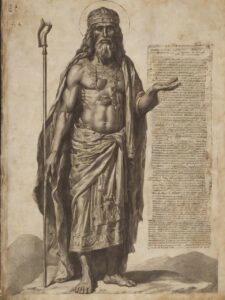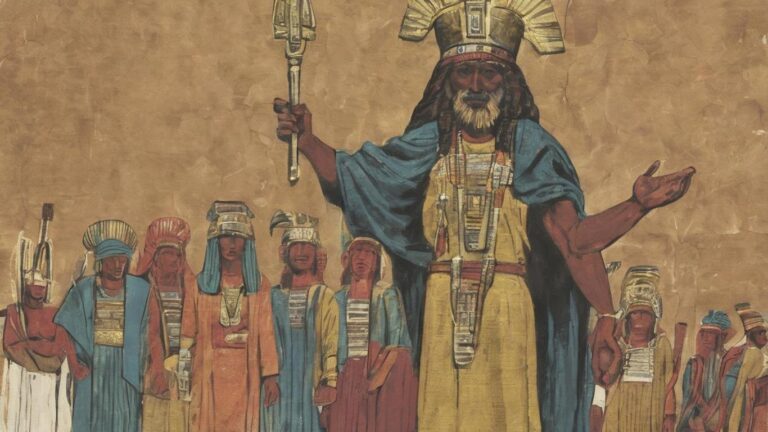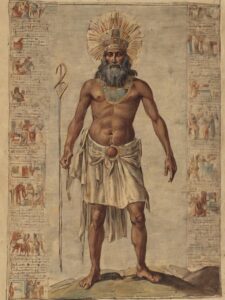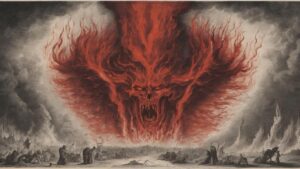Table of Contents
Within ancient Semitic mythology, El, a chief god in the Canaanite and Phoenician pantheon, is often linked to creation and fertility. Within the Bible, El serves as a generic term for God, especially in the Hebrew Bible, referring to the one true God. In later traditions, El is occasionally identified with the God of Israel, notably within the ancient Near Eastern religious milieu. El is also known by the names Elohim and Yahweh in various religious and cultural contexts.
In ancient mythologies, gods often intertwine with creation narratives and evolving cultural beliefs. Although surviving texts don’t explicitly outline El’s ascent to godhood in Canaanite mythology, common themes exist regarding deity origins:
Primordial Existence: Gods are often considered primordial beings associated with the universe’s creation.
Divine Lineage: Some gods descend from other deities or belong to a divine family. El, for instance, is portrayed as the father of numerous gods and goddesses.
Roles and Attributes: Gods gain recognition based on roles and attributes, such as control over nature, fertility, or elements.
Cultural Evolution: The concept of gods evolves as cultures modify religious beliefs, adapting mythologies to changing perspectives.
While a specific myth detailing El’s godhood ascent might be absent, his status as a central figure in Canaanite mythology implies a deep-rooted belief in his divine nature.
Family
In Canaanite mythology, El, a primordial deity, appears, and surviving texts don’t clearly define specifics about his birth or parentage. Ancient religious traditions deeply ingrain the concept of El as a god, and narratives about his origins may have been lost or were not explicitly recorded.
It’s crucial to acknowledge that ancient mythologies often present gods as eternal or primordial, existing without a conventional birth. In many cases, the origins of such deities remain mysterious, emphasizing their timeless and divine nature.
El’s primary consort was Asherah, a goddess linked to fertility, love, and motherhood. Asherah was frequently regarded as the mother of many of El’s children.
El was believed to have numerous children, with varying counts in different traditions. Some sources mention over 70 children, while others offer different figures. Notable offspring included deities like Baal, Yam, Mot, and others.
The Divine Attributes of El

In Canaanite mythology, El emerges as a multifaceted deity, shaping both divine and mortal realms. As a supreme Creator and Ruler, his omnipotence establishes authority over the cosmos.
A beacon of Wisdom and Guidance, El illuminates paths for gods and mortals. Linked to Fertility, his influence fosters abundance in the land, harmonizing with growth and harvest cycles.
In the realm of storms, El, a Storm God, controls nature’s forces. His dominion extends to Divine Justice, ensuring a harmonious balance within celestial and earthly domains.
Each facet of El’s divine nature contributes to the grand narrative, portraying him not merely as a deity but as an influential force shaping Canaanite mythological cosmos.
El in Canaanite Mythology: Unraveling Fragmentary Narratives
In the rich tapestry of Canaanite mythology, El emerges as a significant yet enigmatic figure. Despite the scarcity of detailed narratives specific to El, his prominence in divine assemblies and creation myths is noteworthy.
While stories about El may not be as extensively documented as those in Greek or Norse mythology, Canaanite literature portrays him as the head of the pantheon. He presides over gods and goddesses, contributing to the establishment of divine order.
In some texts, El’s pivotal role in the creation of the world and his interactions with other deities come to the forefront. His consort Asherah and his connections with divine beings like Baal offer glimpses into the intricacies of his significance within the pantheon.
Approaching the study of Canaanite mythology requires acknowledging the fragmentary nature of available material. Interpretations rely on archaeological findings, inscriptions, and comparative analyses with neighboring mythologies. As we delve into the depths of Canaanite lore, the enigma of El beckons for exploration and understanding.
FAQ
What are other names of El?
El is also known by the names Elohim and Yahweh in various religious and cultural contexts.





